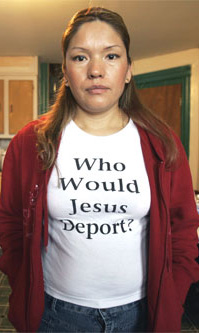
|  |  |  News Around the Republic of Mexico | August 2008 News Around the Republic of Mexico | August 2008  
Families Deported From US Find Helping Hand at Shelter
 Omar Millán González - San Diego Union-Tribune Omar Millán González - San Diego Union-Tribune
go to original


| | Casa Refugio Elvira is named for Elvira Arellano, who was deported in September 2007 after spending a year in a Chicago church despite a court order expelling her from the United States. | | |
Tijuana – Mexican families deported from the United States to Tijuana have a new place where they can contemplate their next move during their time of uncertainty.

It's called Casa Refugio Elvira, in Tijuana's Zona Centro, and it's named for Elvira Arellano, who was deported in September 2007 after spending a year in a Chicago church despite a court order expelling her from the United States.

The shelter is little-known because it hasn't finished the necessary paperwork to register as a nonprofit, but since Dec. 16 it has sheltered and fed 302 deportees.

Micaela Saucedo, the home's director, offers deportees shelter, food and sometimes clothing. She's also an activist with Hermandad Mexicana (Mexican Brotherhood), a U.S.-based group that advocates for Latin American immigrants.

At 4 a.m. and 7:30 p.m., Saucedo stands near the gate where deportees re-enter Mexico, handing out fliers and inviting families to the shelter.

Refugio Elvira is different from other shelters because it accepts only families – siblings, couples or mothers with children. Single men are not allowed.

And, Saucedo adds, deportees are not given set dates to leave the shelter, while other shelters let them stay for a maximum of 15 days.

“When female immigrants come here, they haven't thought about what they're going to do,” Saucedo said. “A lot of them arrive ill, dehydrated or very tired. . . . Here, we give them time they need to decide what they're going to do.”

The apartment the shelter occupies is small but comfortable; it's on a second story and has two bedrooms, a bathroom, a living room and a kitchen. In the tough winter months, up to 25 deportees are sheltered each night, Saucedo said.

Enrique Morones, a local immigration activist who lobbied for the shelter, said the apartment belonged to a relative of one of Hermandad Mexicana's directors. The group negotiated the purchase of the space and turned it into a shelter.

Morones said that when Arellano was deported in 2007, the group realized Tijuana did not have a shelter that could house whole families that had been deported.

Saucedo said Refugio Elvira is self-sustaining and has a secondhand store that helps pay for utilities. A local restaurant donates food, and civic and religious organizations in the United States offer support.

Arellano, the shelter's namesake, has traveled to Tijuana to volunteer at the shelter and often speaks at conferences on immigrants' rights. Since her deportation, she has lived in the Mexican state of Michoacan.

“We know we can't solve all the problems immigrants face, but we can make their lives a little easier when they're deported,” Arellano said.

Omar Millán González is a contributor to the Union-Tribune's Spanish-language newspaper, Enlace. |

 |
|  |



